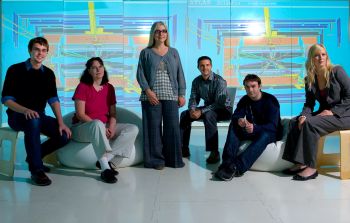Broadcast: News items
Sussex physics team joins Big Bang experiment
By: James Hakner
Last updated: Friday, 23 October 2009

The ATLAS team, from left: Stewart Martin-Haugh, Valeria Bartsch, Antonella De Santo, Fabrizio Salvatore, Anthony Rose and Tina Potter
Physicists from the University of Sussex are taking part in one of the biggest experiments ever constructed to re-enact the birth of the Universe.
A group led by Dr Antonella De Santo are now among 3,000 scientists taking part in the ATLAS Collaboration at CERN, one of the largest and most prestigious physics research laboratories in the world, near Geneva in Switzerland.
ATLAS is one of the two multi-purpose particle physics experiments at the CERN Large Hadron Collider (LHC), a circular, 27km-long accelerator ring located about 100 metres underground across the French-Swiss border.
With data-taking starting in the next few weeks, the ATLAS detector (about half as big as the Notre Dame Cathedral in Paris and weighing 7,000 tons) will seek to discover new physics in the head-on collisions of protons of extraordinarily high energy. Through the data obtained from these collisions, ATLAS will learn about the basic forces that have shaped our Universe since the beginning of time.
Members of the Sussex ATLAS team are making major contributions to the ATLAS project, including searching for Supersymmetry (which predicts the existence "partners" of known particles, which have so far eluded detection). The team will also contribute to the ATLAS trigger system, the experiment's "brain" that must decide which data to keep for further analysis.
The ATLAS experiment will take Sussex physicists into unknown territory, which could shed new light on fundamental questions such as the origin of mass, the nature of Dark Matter in our Universe, or even allow exploring the existence of yet undiscovered additional dimensions of space.
Dr De Santo, who is working full-time on ATLAS at Sussex with colleague Dr Fabrizio Salvatore and another four fellow researchers, including two DPhil students, says: "After a long year of hard work to lead the group into ATLAS, I am extremely pleased that Sussex is now part of the Collaboration. With first collisions expected in a matter of weeks, experimental particle physics is set to enter a new golden era. There couldn't be a better time to join ATLAS, one of the most exciting physics endeavours for generations. It's just great that Sussex can be part of it!"
Professor Philip Harris, Head of the Experimental Particle Physics (EPP) group in the University's Department of Physics and Astronomy , says: "This is a great achievement for our group, which is now one of only two in the country to be involved in two of the Science and Technology Facilities Council's three highest priority particle physics experiments."
Head of the Department of Physics and Astronomy, Dr Mark Hindmarsh, says: "The Department is delighted with the news, which confirm Sussex's outstanding international reputation for research. These are exciting times for science and we look forward to sharing our EPP colleagues' successes for many years to come."

